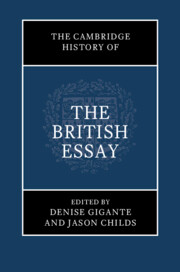Book contents
- The Cambridge History of the British Essay
- The Cambridge History of the British Essay
- Copyright page
- Contents
- Illustrations
- Contributors
- Acknowledgements
- Preface to a History in the Manner of an Essay
- Part I Forming the British Essay
- Part II The Great Age of the British Essay
- Part III Assaying Culture, Education, Reform
- 20 The Essay and the Theme
- 21 The Academic Essay: Rhetoric and Pedagogy
- 22 The Essay and the Rise of University English
- 23 Victorian Essays in Criticism
- 24 Nineteenth-Century Reviews Reviewed
- 25 Essays in the ‘Golden Age’ of the British Newspaper
- 26 The Essay in the Age of Chartism
- 27 Political Theory and Ethics in the Victorian Essay
- 28 Plain English: Essays and Analytic Philosophy
- Part IV Fractured Selves, Fragmented Worlds
- Part V The Essay and the Essayistic Today
- Book part
- Bibliography
- Index
24 - Nineteenth-Century Reviews Reviewed
from Part III - Assaying Culture, Education, Reform
Published online by Cambridge University Press: 31 October 2024
- The Cambridge History of the British Essay
- The Cambridge History of the British Essay
- Copyright page
- Contents
- Illustrations
- Contributors
- Acknowledgements
- Preface to a History in the Manner of an Essay
- Part I Forming the British Essay
- Part II The Great Age of the British Essay
- Part III Assaying Culture, Education, Reform
- 20 The Essay and the Theme
- 21 The Academic Essay: Rhetoric and Pedagogy
- 22 The Essay and the Rise of University English
- 23 Victorian Essays in Criticism
- 24 Nineteenth-Century Reviews Reviewed
- 25 Essays in the ‘Golden Age’ of the British Newspaper
- 26 The Essay in the Age of Chartism
- 27 Political Theory and Ethics in the Victorian Essay
- 28 Plain English: Essays and Analytic Philosophy
- Part IV Fractured Selves, Fragmented Worlds
- Part V The Essay and the Essayistic Today
- Book part
- Bibliography
- Index
Summary
The review essay emerged in the seventeenth century and entered the publishing mainstream in the middle of the eighteenth, when Ralph Griffiths founded his Monthly Review, the first journal devoted entirely to book reviewing. But it was The Edinburgh Review that electrified the publishing world and put the review essay at the centre of British cultural and political life. Established in 1802, and edited by Francis Jeffrey, the Edinburgh exuded confidence, bristled with vitriol, celebrated Whiggism, and condemned injustice. Seven years later, Tories fought back with the founding of The Quarterly Review, edited by William Gifford, which set itself in opposition to the Edinburgh on all the major issues of the day. Blackwood’s Edinburgh Magazine was a more agile and belligerent Tory alternative to the Quarterly, but it gradually grew more moderate and in the 1830s was eclipsed by its most raucous imitator, Fraser’s Magazine.
Keywords
- Type
- Chapter
- Information
- The Cambridge History of the British Essay , pp. 356 - 372Publisher: Cambridge University PressPrint publication year: 2024

